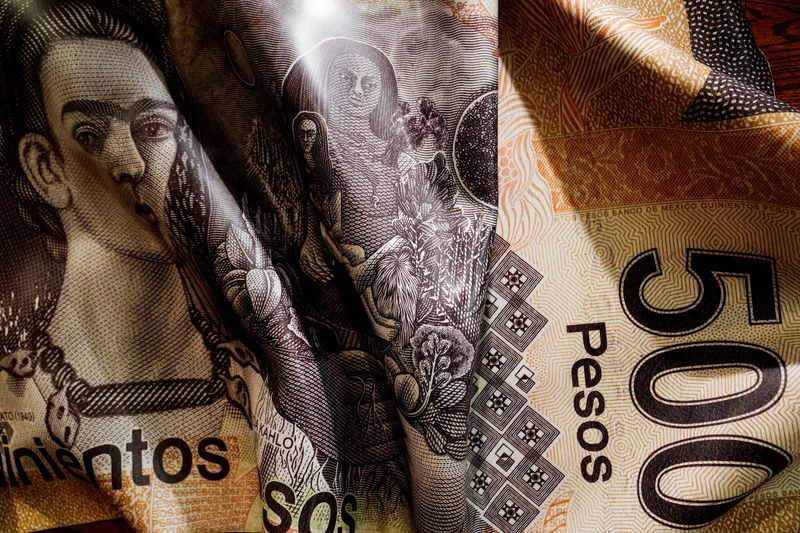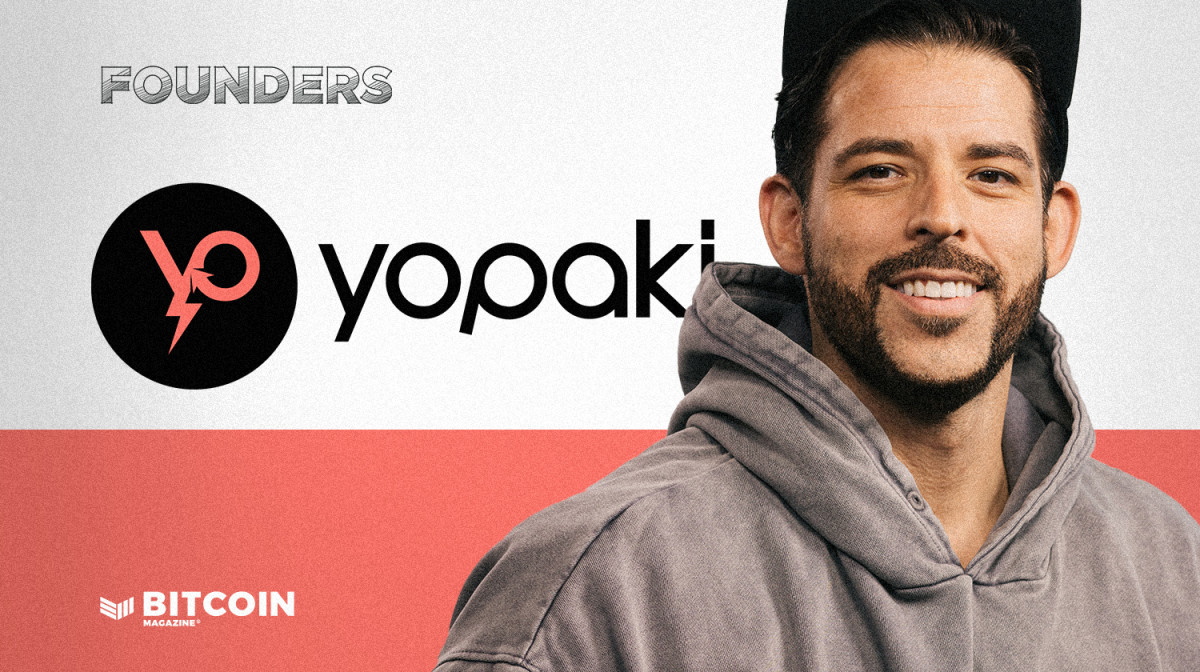Month: December 2024
Mexican peso posts biggest annual drop versus US dollar in 16 years
Post Content
Neobank Yopaki Aims To Make Every Mexican A Bitcoiner
Company Name: Yopaki
Founders: Francisco Chavarria (CEO) and Carlos Chida (CTO)
Date Founded: March 2023
Location of Headquarters: Austin, TX
Number of Employees: Four full time; one part time
Website: https://www.yopaki.com/
Public or Private? Private
In 2021, Francisco Chavarria stood in the audience at Bitcoin 2021 and watched as Strike CEO Jack Mallers passionately delivered his now famous keynote speech during which he revealed that El Salvador planned to make bitcoin legal tender.
That moment sparked something within Chavarria.
“It was unlike anything I’d experienced in my professional career,” Chavarria told Bitcoin Magazine.
“I knew I had to do something in the Bitcoin space after that. It was the seed,” he added.
First-forward ahead two years, and Chavarria found himself putting his career as a Software as a Service (SaaS) consultant on hold to draw up the blueprints for Yopaki, a neobank and investment app with a Bitcoin-focus, aimed at serving the people of his home country, Mexico. (Users outside of Mexico can also use Yopaki’s non-custodial Lighting wallet.)
Since then, he and his co-founder, Carlos Chida, have been hard at work bringing Yopaki to life, including taking part in Wolf’s Bitcoin Accelerator program in efforts to make Yopaki as cutting-edge and dynamic as possible.
But before getting to that part of the story, let’s start with the cultural origin of the platform’s name.
What’s In A Name?
“The name Yopaki comes from the ancient language Nahuatl, the language spoken by the Aztecs,” explained Chavarria.
“The Aztecs lived in the center region of what today is Mexico, and they’re the ones responsible for some of the biggest pyramids in all of Latin America. The center of this historical place is called Teotihuacán, ‘the place of the gods,’” he added.
“The name itself, if I were to translate it into English, most closely means “the pursuit of happiness.’”
Judging by the name alone, it’s clear that Chavarria views Yopaki as more than just another business endeavor — he wants it to have a profound impact on those who use it.
And he’ll need the app to have such an impact if he and his team are to succeed in their mission: to turn every Mexican into a Bitcoiner.
2025 Dream Predictions for Bitcoin in Mexico 
1. Bitcoin adoption in Mexico surges.
2. Mexican Bitcoin startups attract global investors. With El Salvador’s influence, Mexico becomes the Latin American leader for Bitcoin innovation.
3. Peso-Bitcoin integration deepens.…
— Francisco Chavarria (@FranciscoBTC) December 31, 2024
Bitcoin In The Mexican Context
When Bitcoin is brought up in the context of Latin America and other developing regions, it’s often referenced as a tool to “bank the unbanked.”
However, Mexico’s banking system is “quite advanced,” according to Chavarria.
“The infrastructure has been built for people to have access to banking,” he explained.
“It may not be the same banking that we have in the U.S. (where Chavarria currently resides), but, for example, in Mexico, there are stores like 7/11s called OXXOs, and they’re everywhere. Any person can walk into an OXXO with an ID, and within 20 minutes, they can walk out with a Visa card and an app,” he added.
“It’s not exactly a bank, but it provides access to payment rails,” he added.
Chavarria went on to share that these Visa cards charge high fees, though.
“They’re very predatory in that sense,” he said.
So, Yopaki provides its Mexican users with access to three different monetary accounts: a Mexican peso account, a U.S. dollar account and a (non-custodial) bitcoin Lightning wallet. Each of these accounts lets their users transact at lower rates than said Visa cards. (In 2025, Yopaki will also enable its Mexican users to buy stocks, ETFs and other securities, as well.)
By offering a bitcoin wallet alongside accounts for traditional currencies, Chavarria hopes to legitimize bitcoin in the eyes of its users. However, he also feels that Yopaki has some work to do as far as helping Mexicans to get comfortable using bitcoin, which is why he and his team are doing what they can to make the process enjoyable.
Making Bitcoin Fun With Lotería
Lotería is a favorite pastime of the Mexican people. It’s comparable to Bingo but with images instead of numbers.
Chavarria and the Yopaki team included it into the app with a Bitcoin slant — concepts and characters like the Lightning Network and Max Keiser appear in the Yopaki version of the game.
“When it comes to Mexico, people think tequila, tacos, mariachi, and Lotería,” said Chavarria.
“There’s no negative connotation to the game. Because of this, the feedback we’ve received over the last couple of months has been, ‘Man, I didn’t realize that Bitcoin was fun,’” he added.
Users earn sats as they play Lotería within the app. When they’ve earned 1,000 sats or more, they can learn through the app how to transfer those sats from Yopaki’s custody into their own, all within the Yopaki app.
Yopaki teamed up with Breez to bring its users a non-custodial Lightning wallet that doesn’t require its users to to deal with the hassle of Lightning channel management.
Yopaki + Breez
“One of the main reasons we decided to go with Breez is that we knew about their implementation of the Nodeless SDK through Liquid before it was public,” said Chavarria.
“We know channel management is a fundamental roadblock for a lot of people in using an application like this. The second you introduce roadblocks the experience becomes scary. It’s just too much,” he added.
“So, in offering a product in which users can do an immediate transaction, that magic that we’ve all had as Bitcoiners can be brought to the masses.”
Chavarria went on to share that Yopaki’s Lightning wallet is so easy to use that even his mother-in-law is now using (and enjoying) the product.
He’s excited to bring such a product to the Mexican market, because, as he put it, Mexicans “have been rugged” by custodial solutions in the past.
“It’s important that we let users know that we don’t hold their funds,” said Chavarria.
Prioritizing Bitcoin Education
Not only does the Yopaki team encourage and prioritize self-sovereignty, but it also educates its users about Bitcoin, as it doesn’t underestimate their curiosity and ability to learn.
“We have curated content including lessons on broad topics like ‘What is money?’ — not just Bitcoin, but money,” explained Chavarria.
“They’re micro lessons that take anywhere from one to two minutes to complete. At the end of the day, it’s about creating a curiosity that I feel and I think a lot of us feel the legacy system has not really cared about,” he added.
The educational component within the app also sets it apart from its competitors in the region.
“Bitso is the largest player not just in Mexico but all of Latin America, and we have a lot of respect for what they’ve done, but they have turned into a casino with tokens and NFTs and all of that,” shared Chavarria. “We believe they have really underestimated the curiosity of their users and just triggered the degenerate gambling addiction side of things instead.”
Guidance From Wolf
Given how cool, calm and collected Chavarria was when I spoke with him, I got the impression that the now fleshed out vision for Yopaki came to him with relative ease, maybe even in a flash of light.
But he told me otherwise.
Apparently, he and Chida’s experience at Wolf’s Bitcoin startup incubator pushed them out of their comfort zone and into a state of mind that helped them to make Yopaki as unique as it is.
“It was one of the most important and meaningful experiences we could have gone through,” said Chavarria of his time at Wolf. “The type of feedback we received and the type of strategy sessions we had were, to say it nicely, brutal in a good way.”
Chavarria explained how he and Chida did, in fact, enter the Wolf program thinking they’d already crafted a solid vision for Yopaki, but that the guidance they received in the program is what pushed them to create many of the features that differentiate the apps for others like it.
“Having people like Kelly Brewster (Wolf’s CEO), who has years of experience at Goldman Sachs, and Ross Stevens (Wolf’s founder) really sit down and ask the tough questions and push you to the limit was powerful,” said Chavarria. “They made us really consider ‘Do you understand that what you’re doing is difficult?’ and made us articulate how we were going to execute our plan.”
The Year Ahead
As mentioned, Yopaki will enable its Mexican users to begin investing in traditional assets in the coming year and, starting next month, it will offer users a bitcoin exchange, as well.
What is more, it will issue its users debit cards that they can use to spend their pesos, dollars or bitcoin. And Chavarria says it plans to offer sats back rewards when users purchase either traditional assets or bitcoin via the app.
With so much coming down the pike, Chavarria is in good spirits.
“I’m just grateful that we’re doing this,” he said.
“It’s been really fun to build in the bear — now the good times are coming.”
WATCH: Michael Saylor’s Bitcoin $100K Party
The moment Bitcoiners around the world have been waiting for is finally here: Bitcoin has hit the monumental $100,000 mark, and Michael Saylor is throwing the Party of the Century to celebrate!
What started as a dream and a meme has now become a reality, as Michael Saylor, a legendary advocate for Bitcoin and Executive Chairman of MicroStrategy, is hosting the most epic New Year’s Eve celebration to mark this historic occasion.
Bitcoin Magazine is thrilled to announce that we are streaming live from the event in Miami Beach, bringing the excitement of Saylor’s $100K Bitcoin party straight to your screens. From 7:00 PM to 2:00 AM EST, join us on the Bitcoin Magazine News Desk, hosted by Pete Rizzo.
The Party has been hyped for years and is set to deliver on all fronts. Your favourite Bitcoiners and podcasters will attend, including the man of the hour, Michael Saylor, Preston Pysh, American Hodl, Peter McCormack, and other Bitcoin legends. Expect lively and fun discussions as Bitcoiners come together to ring in 2025.
This exclusive live stream will give you front-row access to the celebration as we welcome a new year—and a new era for Bitcoin.
Catch the Bitcoin Magazine News Desk live stream on X and YouTube starting today, December 31, 2024, at 7:00 PM EST.
Montenegro says it extradites Terraform Lab co-founder Do Kwon to US
Post Content
Dollar slips, but on track for hefty gains in 2024
Post Content
Asia FX set for yearly losses as strong dollar weighs; China factory data in focus
Post Content
Why I Capitulated And Started Buying MSTR
Follow Nikolaus On 𝕏 Here For Daily Posts
Look, I know I am late to the party.
I remember covering the news of MicroStrategy’s first bitcoin purchase, and I’ve watched the stock rise from $14 to $400 per share. All that time, I didn’t buy.
Yet, this past Friday, for the first time since 2018, I bought stocks — specifically MicroStrategy (MSTR) and a couple other companies also holding bitcoin on their balance sheets. It was something I never thought I’d do again.
In 2018, I sold all my stocks for more bitcoin when the price crashed into the $3,000 range, and I have not purchased any other asset than bitcoin since then.
That changed this week. I was reading this interesting thread from Jeremy Garcia, founder and CEO of Satoshi’s Journal, and he was summarizing MicroStrategy’s Q3 2024 earnings call from earlier this year. It made me come to some realizations.
First, if bitcoin is going to succeed in reaching a price in the hundreds of millions and beyond, then it makes sense to get some exposure to a company that now holds 446,400 BTC, is trading in the Nasdaq 100 Index, and has the future potential of joining the S&P 500.
A strategic bitcoin reserve strategy has the potential to make MicroStrategy one of the most, if not the most, valuable company in the world, and MicroStrategy is only going to continue to buy more bitcoin, according to Michael Saylor himself.
If MicroStrategy is to become the world’s most valuable company, then their stock price today would be extremely undervalued to what it would be at that point in the future. Why wouldn’t I buy some? I already feel dumb enough for not buying any. Sure my bitcoin has performed extremely well, but MSTR has outperformed bitcoin.
I know I could just buy spot bitcoin, and maybe that’s the safest play to make. But I’ve also been accumulating bitcoin for a long time, and am interested in allocating some capital to buy shares in companies also betting on bitcoin’s future success.
I would be earning more fiat that I could then take and buy more bitcoin (if the stocks outperform BTC) but even if they don’t, it gives me the opportunity to take profit and use it for life expenses.
Another thing in the back of my mind is, what if something unforeseen happens in the future and I mess up and lose my bitcoin stack due to a personal error.
I’ll admit, I have anxiety knowing that even though I have thought out my bitcoin custody, and taken the necessary steps to properly secure my coins, something could still go wrong.
In this way, the thought of having some other assets to fall back on just in case is a positive.
Look, I’m bullish on bitcoin. And if bitcoin succeeds then I think the companies, individuals, and countries adopting it will likely succeed as well.
I love winning, and want to get some exposure to companies also winning big. If I am wrong on these bets then so be it, it’s only a small allocation to my overall portfolio. But the potential upside is worth the time and risk I think.
None of this is financial advice, I’m just sharing my thoughts on what I’m doing as a Bitcoiner. For now, that means I’m buying MSTR.
This article is a Take. Opinions expressed are entirely the author’s and do not necessarily reflect those of BTC Inc or Bitcoin Magazine.
Bitcoin: Use It Or Lose It
Whenever concerns surrounding Bitcoin’s long term prospects’ going in a negative direction surface, a common refrain of dismissal is “Well tell us what to do about it then.” This is used to dismiss all concerns of regulation leading to regulatory capture, of deeper involvement of certain entities leading to higher risks to the consensus process, of any type of failure mode that involves Bitcoin’s censorship resistance and ability to enable freedom eroding really.
“Well what’s your plan?”
Use Bitcoin. Bitcoin consensus orbits around two important variables, economic actors and miners. Economic actors decide whether a set of consensus rules has value by deciding whether to honor their side of a transaction based on whether it is valid according to their consensus rules. Miners decide which set of consensus rules they will mine within, choosing the one that presents the highest value to them.
Users who actually use Bitcoin, that is to transact and operate businesses, services, and other protocols to make use of blockspace, gain an influence through both mechanisms. A set of consensus rules needs two things, users who will value it, and miners who will mine it. Users buying blockspace attract miners with more revenue beyond what the block subsidy creates. To the degree that fees make up miners’ revenue, users who generate those fees have that much proportionate “power” of a sort over miners. They decide in the event of a disagreement over consensus rules which side to give that revenue to, meaning miners would have to follow those rules to earn it.
The threat of institutional adoption and regulatory encroachment very much do present a risk to Bitcoin in the long term if people simply stop doing anything with bitcoin but hold it. In that type of environment, regulations can come down on miners and brokers and very much influence events around consensus changes. They can attempt to veto useful and valuable changes, and try to push useless or damaging ones.
So what do we do to counteract that? We actually use Bitcoin for more than holding and investing. That is why scalability is so important. Because it allows more people to directly interact with the system in that way, to directly exert their influence. The more we actually use Bitcoin, the more influence users collectively have to exert in the future over consensus.
If Bitcoiners relegate bitcoin to nothing more than an asset to hold, something to let sit idle, then we will eventually lose it. We will lose our say and influence in the markets bitcoin facilitates, we will lose our influence over the consensus rules that miners choose to mine, we will lose it all.
Bitcoiners need to be active, not passive. We need to transact, we need to build more businesses, consume more blockspace. With payment networks like Lightning or Ark, uncensorable derivatives markets using DLCs, even dumb things like Ordinals and Inscriptions. The demand for blockspace needs to come from distributed and diverse sources, not just massive institutions and companies easily subjectable to regulatory and government influence.
Bitcoin is very much a “use it or lose it” thing. I’d rather not see it lost to people who actually care about freedom due to apathy.
This article is a Take. Opinions expressed are entirely the author’s and do not necessarily reflect those of BTC Inc or Bitcoin Magazine.
Earn Bitcoin For Providing Liquidity Via Boltz Pro
Today, Boltz is launching Boltz Pro, a service that lets users help Boltz manage its bitcoin wallet and Lightning channel liquidity, and I plan to test it out.
But first some background on how Boltz Pro works.
According to Kilian, a co-founder of Boltz, the balances of Boltz’s wallets and Lightning channels are constantly shifting, especially as the volume and velocity of sats flowing through the platform increases.
So, the idea behind Boltz Pro is that users can help provide liquidity for swaps in the event that Boltz’s balances run low.
Here’s an example:
Let’s say Boltz is running short on its base chain bitcoin supply. Boltz will set its dynamic fee to -0.15% for bitcoin-to-Lightning swaps. This means that users get paid a 0.15% fee.
Once Boltz has seen enough volume flow in this direction and Boltz’s bitcoin wallet is refilled, fees will return to normal.
You won’t need to sign up to use Boltz Pro. Just stay on the lookout at https://pro.boltz.exchange/ for when fees on the platform flip negative and take advantage of the opportunity. And keep in mind that Boltz never takes custody of user funds, so you get to earn these sats in a non-custodial manner.
This is now the first place I’ll check when I’m looking to move sats between the base chain and Lightning or vice versa, as I’d much rather be paid to use Boltz than pay to use it.
Kudos to Boltz for enabling users to make a few extra sats for helping them out.
This article is a Take. Opinions expressed are entirely the author’s and do not necessarily reflect those of BTC Inc or Bitcoin Magazine.
A Progressive Case for a Strategic Bitcoin Reserve: Strengthening America’s Social Safety Net
From Trey Walsh, Executive Director of The Progressive Bitcoiner
I’ll start off by saying I have many reservations about the United States pursuing a Strategic Bitcoin reserve, with the major plans I’ve observed including legislation proposed by Senator Lummis and a draft Executive order from the Bitcoin Policy Institute (this does not include those proposed state-by-state, which is a different focus and a bit more straight forward given they hold some bitcoin to diversify their assets). My reservations include timing, political (polarizing) ramifications, mechanisms/cost of obtaining Bitcoin, why the U.S. would pursue this as a nation already leading as the world reserve currency, government getting more involved with Bitcoin could lead to more involvement/influence with Bitcoin’s development, and ramifications on Bitcoin as money for U.S. citizens (would privacy, medium of exchange, self-custody be at greater risk?). I think Nic Carter wrote an excellent piece questioning the SBR and advocating against the U.S. pursuing this which I’d highly encourage you to read.
While I have seen support for the SBR from Bitcoin proponents, mostly GOP politicians and Trump (in fairness Democratic Rep. Ro Khanna has said he’s supportive in theory I believe), there has yet to be any attention paid to this in a positive way from progressives. In fact, really only criticism. While I have my reservations and criticisms as I’ve clearly stated to be transparent here, I’d like to focus on some ways in which a U.S. Strategic Bitcoin Reserve could actually be a positive thing for Americans, from a progressive’s lens and values with an emphasis on social safety net spending. This has yet to be discussed at any scale, and I’d like to offer some thoughts, and some actual social good this could do besides just “strengthen the United States as a global power and strengthen the dollar.” Ok, but what could this do for actual, every day people in America? That’s what I care about, and probably you too.
This overwhelming image was captured today from https://www.usdebtclock.org/. What the U.S. doesn’t have a solid answer for is how we are going to pay for the vital services needed and expected from citizens at this point when facing a debt and spending crises compared to our budget/tax receipts. Depending on who you ask and which economic theories you subscribe to, there are different ways for handling this—but the issue remains: the U.S. is kicking the can down the road regarding debt, spending and refusing to either raise taxes or cut spending dramatically and catastrophically. I wanted to set the stage first, and then offer some strategic use cases of a SBR toward social safety net spending, the budget deficit, and a government by the people, for the people with Bitcoin.
1. Hedge Against Inflation to Protect Public Programs
Stability for Social Spending: Inflation and currency devaluation erode the purchasing power of government budgets, reducing the effectiveness of social safety net programs. A Bitcoin reserve, as a deflationary asset, could serve as a hedge against such economic risks, ensuring stable funding for programs like Medicare, Medicaid, and Social Security. As things get more expensive in fiat terms (salaries, healthcare bills, vital hospital technology, medications, treatments, etc) they get cheaper in Bitcoin terms.Future-Proofing Benefits: Bitcoin’s limited supply could protect against long-term depreciation of fiat currency, ensuring that entitlement programs maintain their value and benefit recipients in the decades to come.
2. Revenue Generation for Safety Nets
Asset Appreciation: Bitcoin has shown significant price appreciation over the long term. A government-held Bitcoin reserve could be leveraged during times of financial need to generate additional revenue for funding social programs. The key here is a long-term view, not short term trading.Controlled Liquidation: Under a progressive framework, the government could design strict protocols for selling portions of the reserve during economic downturns or crises to avoid undermining the reserve’s long-term value while supporting public welfare.
3. Alternative to Taxpayer Burden
Reducing Taxpayer Reliance: Traditionally, funding for social safety nets comes from taxes, which can disproportionately impact middle- and lower-income households. A Bitcoin reserve could provide an alternative funding source, reducing the reliance on direct taxation for safety net programs.Reducing deficit spending: One of the leading cases of inflation is deficit spending via money printing mechanisms from the Fed, Treasury and Congress passing legislation well beyond our assets and tax receipts. A SBR could be used to help us rely less on the money printing that is responsible for overwhelming inflation on the lower and middle class that is often use to fund our government and social safety net programs. By including Bitcoin alongside traditional reserves like gold, the government could enhance its fiscal capacity to sustain welfare programs without relying on deficit spending.
4. Emergency Financial Assistance
Crisis Mitigation Fund: During financial crises, the government often struggles to rapidly mobilize resources for safety net expansions. Bitcoin, being highly liquid and accessible globally, could act as an emergency reserve for direct cash transfers or funding unemployment benefits in times of economic distress.Global Remittance Efficiency: Bitcoin’s borderless nature could streamline the delivery of international aid or remittances to support diaspora communities or vulnerable populations abroad, aligning with progressive values of global equity.
5. Promoting Financial Inclusion for Vulnerable Populations
Bridging the Wealth Gap: A Strategic Bitcoin Reserve could be paired with policies that encourage public ownership of Bitcoin, offering individuals and communities the ability to participate in a financial system that is less dependent on traditional banking structures. Look to programs such as the Alaska Permanent Fund which pays dividends based on Alaska’s oil reserve and productionDirect Redistribution Mechanisms: The government could use gains from Bitcoin reserves to fund Universal Basic Income (UBI) programs or targeted assistance for low-income households. Margot and I discussed this possibility with Scott Santens, a leading expert on UBI on our podcast.
While not directly connected to the SBR, the acceptance of Bitcoin at this stage could open the door for more possibilities regarding Bitcoin mining and the community.
6. Incentivizing Green Bitcoin Mining for Job Creation
Jobs for At-Risk Communities: Bitcoin mining operations, if incentivized to use renewable energy, could create jobs in underserved regions, providing a dual benefit of economic revitalization and environmental progress.Revenue for Local Governments: Tax revenues generated from sustainable Bitcoin mining operations could be redirected to strengthen local safety nets, such as affordable housing or community healthcare initiatives.
7. Economic Resilience to Fund Long-Term Programs
Buffer Against Economic Crises: In times of economic downturns or geopolitical instability, Bitcoin’s independence from fiat currency systems could provide a financial buffer. This could ensure that critical safety net programs continue to operate without disruption.Strengthening the Social Contract: By maintaining a reserve that safeguards national economic security, the government reinforces its commitment to protecting vulnerable populations, which is a core progressive principle.
8. Enhancing Public Trust in Social Programs
Transparent Funding Mechanism: Bitcoin’s blockchain technology ensures a transparent ledger. Using a Bitcoin reserve to partially fund social programs could increase public trust in how resources are allocated and managed, reducing skepticism about government waste or corruption. The SBR bitcoin addresses would be made public (like El Salvador does)Public Ownership: Progressives could propose allocating a small portion of Bitcoin gains directly to citizens through rebates or credits tied to social programs, creating a tangible connection between national reserves and public benefit. Again, back to a dividend or UBI approach
This is just the tip of the iceberg for how progressives might theoretically approach a Strategic Bitcoin Reserve. While this is more of an intellectual exercise at this point, and my focus continues to be on grassroots adoption of Bitcoin and how this can transform individual’s lives and communities around the world, it raises an important point — what social good could we imagine Bitcoin providing in our ever evolving, changing, and fiscally challenging world? Beyond just number go up, crypto traders, and wall street getting richer, what role can Bitcoin play in improving the lives of everyday people at a deep, structural level? We’ll continue to explore these questions here at The Progressive Bitcoiner.
This is a guest post by Trey Walsh. Opinions expressed are entirely their own and do not necessarily reflect those of BTC Inc or Bitcoin Magazine.









